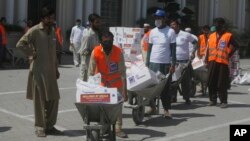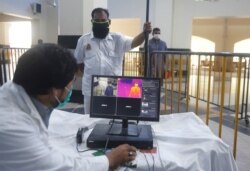Pakistan has announced it will gradually ease a nationwide coronavirus-related “partial" lockdown starting Saturday, saying the number of COVID-19 infections remain relatively low and under control. COVID-19 is the disease caused by the coronavirus.
The pandemic hit Pakistan in late February. Since then, officials have recorded more than 24,000 confirmed cases and nearly 600 deaths.
Prime Minister Imran Khan on Thursday chaired a meeting of top government officials where the decision was taken to relax restrictions on public and industrial activities.
“We know our curve of infections and deaths (from COVID-19) is gradually rising. But the rate of increase is relatively very low in Pakistan,” Khan said in his post-meeting nationally televised remarks.
In defending the decision, Khan said it is not possible for anyone to predict when and if Pakistan will experience a peak like that of Europe and other worst-hit areas.
“Why are we going ahead to ease the lockdown? Because people in our country, particularly daily wagers, small shopkeepers, taxi drivers, laborers, white-collar families are all facing an extremely difficult situation to feed their families,” Khan said.
The Pakistani prime minister, however, emphasized that everyone must show compliance with the government’s safety protocols and take the necessary precautions to prevent COVID-19 from spreading.
“If the people fail to behave responsibly and eventually there is a spike in cases, we will have to enforce the lockdown again,“ he said.
Khan noted that the government has a period of one month to disperse cash grants to about 12 million poverty-stricken families from an emergency package of nearly $1 billion to help them buy essential food items for the next four months.
But the outbreak and the ensuing lockdown have also badly hit Pakistan’s fragile economy, preventing the government from sustaining any relief programs beyond a certain period of time, the prime minister said.
Meanwhile, the United States announced a new contribution of $7.5 million Thursday to support the Pakistani government’s program to provide financial relief to those vulnerable to the economic fallout from the coronavirus, and a therapeutic food program for children diagnosed with acute malnutrition.
Since designating Pakistan a priority country for coronavirus assistance, the U.S. has committed nearly $15 million in new funding to Islamabad, according to a U.S. embassy announcement.
At Thursday’s meeting, the Pakistani government said educational institutions across the country will remain closed until July 15 and canceled all exams that are usually scheduled during this time of the year.
Health officials maintain the number of COVID-19 cases are rising in Pakistan because of increased testing capacity but that the focus on the pandemic is affecting Pakistan’s efforts against other communicable and noncommunicable diseases.
Pakistan, together with neighboring Afghanistan, are the only two countries where the poliovirus remains endemic. Pakistan also has the highest number of people suffering from hepatitis C, after China, with an estimated 8 million Pakistanis living with the disease.





